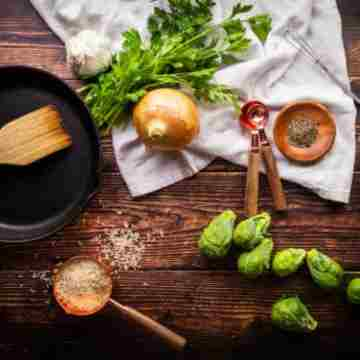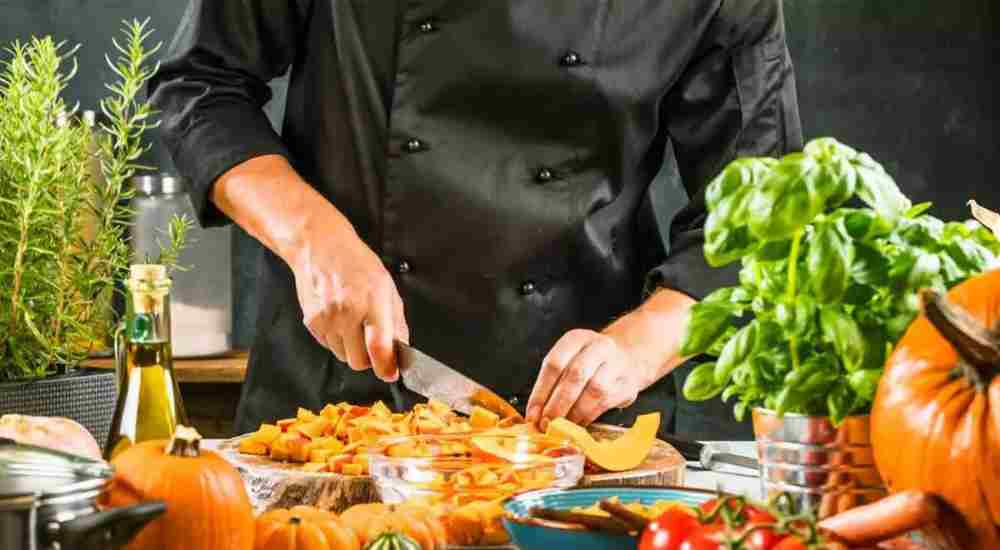In this era of convenience, where cooking skills seem to be waning, we’re here to reignite the flame of culinary creativity. Join us as we celebrate National Cooking Day, a day dedicated to the art and pleasure of cooking.
National Cooking Day isn’t just another date on the calendar. It’s a day that encourages and inspires each of us to step into the kitchen, explore our culinary talents, and embark on a journey of taste and discovery. It’s a day when the apron becomes our badge of honor, and the kitchen, our canvas. National Cooking Day is more than just a celebration; it’s a reminder of the joy that comes from preparing a meal from scratch, the satisfaction of sharing it with loved ones, and the fulfillment of mastering a new skill.
As we delve deeper into the world of cooking, let us explore the historical milestones, the cultural significance, and the reasons why this day matters now more than ever. Join us in commemorating National Cooking Day and reignite your passion for cooking, because there’s no better way to nourish the soul than with a lovingly prepared home-cooked meal.
The Evolution of National Cooking Day
Cooking is a fundamental human activity that has evolved and adapted throughout history. It’s not just about sustenance; it’s a reflection of our culture, innovation, and creativity. To truly appreciate the significance of National Cooking Day, we must take a journey through time, exploring the pivotal moments that have shaped the world of cooking.

1810: The Birth of Convenience
In 1810, Englishman Peter Durand patented the tin can, forever changing the way we preserve and consume food. Canned food brought unprecedented convenience, making it possible to enjoy meals without the need for immediate preparation. It marked a significant shift in the way we approach cooking, allowing for greater flexibility in meal planning and storage.
1963: Julia Child’s Culinary Revolution
Fast forward to 1963, when Julia Child’s iconic television series, “The French Chef,” made its debut on Boston public television. Julia Child’s passion for French cuisine and her charismatic teaching style inspired a generation of home cooks. Her influence reached far beyond the screen, igniting a culinary revolution that encouraged people to explore new flavors, techniques, and international cuisines. Julia Child’s impact on the world of cooking is immeasurable, and her legacy continues to inspire chefs and food enthusiasts worldwide.
2009: “Julie & Julia” and the Love of Food
In 2009, the film “Julie & Julia” premiered, captivating audiences with the story of a New York City-based writer who embarked on a year-long journey to cook all of Julia Child’s recipes. This heartwarming tale showcased the transformative power of cooking, highlighting how a deep connection with food can lead to personal growth, self-discovery, and the joy of sharing culinary experiences with loved ones. “Julie & Julia” reignited our collective fascination with the art of cooking and reinforced the idea that there’s more to a meal than what’s on the plate.
Cooking’s Cultural Significance
Cooking isn’t just about sustenance; it’s a rich tapestry of traditions, flavors, and memories. Throughout history, it has been a means of cultural expression, with each region and community infusing its unique identity into its cuisine. Cooking has the power to bridge generations, preserve heritage, and create moments of togetherness.
Why National Cooking Day Matters
National Cooking Day isn’t just another holiday on the calendar; it’s a celebration of something deeply meaningful and essential in our lives. Let’s delve into why this day matters and why you should join the festivities.
Reconnecting with Traditional Cooking
In our fast-paced, modern world, many of us have drifted away from the traditional cooking practices that have been passed down through generations. National Cooking Day serves as a gentle nudge to reconnect with these time-honored culinary traditions. It’s an opportunity to rediscover the recipes and techniques that have shaped our family histories and cultural identities. By embracing traditional cooking methods, we preserve our heritage and keep our cultural legacies alive.
Promoting Healthy Eating
One of the most significant advantages of cooking at home is the control it gives us over the ingredients we use. National Cooking Day encourages us to take charge of our diets and make healthier choices. When we prepare our meals, we have the power to select fresh, wholesome ingredients, reducing our reliance on processed and unhealthy options. It’s a chance to prioritize nutrition and make conscious decisions that benefit our well-being.
Fostering Family Bonding
In today’s hectic world, finding time for quality family moments can be a challenge. National Cooking Day provides the perfect opportunity to come together as a family, bond over a shared activity, and create lasting memories. Cooking as a family not only strengthens relationships but also imparts valuable life skills to children. It’s a chance to pass down recipes, stories, and the joy of cooking from one generation to the next.
The Benefits of Home-Cooked Meals
Home-cooked meals offer a multitude of benefits that extend beyond taste and nutrition. Consider these advantages:
Cost-Effectiveness: Cooking at home can be significantly more budget-friendly than dining out or relying on pre-packaged meals. With proper planning and smart shopping, you can stretch your dollars further while still enjoying delicious meals.
Better Health: Home-cooked meals tend to be lower in added sugars, unhealthy fats, and excess sodium. By preparing your meals, you have control over portion sizes and can make healthier substitutions, contributing to improved overall health.
Mental and Emotional Well-Being: The act of cooking itself can be therapeutic. It provides a creative outlet, reduces stress, and fosters a sense of accomplishment. Sharing a home-cooked meal with loved ones enhances feelings of connection and happiness.
Cooking Tips and Tricks
Cooking can be both a delightful adventure and a comforting routine, but it’s always better with a few tricks up your sleeve. Whether you’re a beginner taking your first steps in the kitchen or an experienced cook looking to elevate your culinary game, these practical tips and ideas will serve you well:
1. Essential Cooking Tips
a. Read the Recipe First: Always start by reading the entire recipe before you begin cooking. This ensures you have all the necessary ingredients and equipment and understand the steps involved.
b. Prep Before You Cook: Prepare all your ingredients before you start cooking. This includes chopping vegetables, measuring out spices, and having everything within arm’s reach. It makes the cooking process smoother.
c. Taste as You Go: Don’t hesitate to taste your dish as it cooks. It allows you to adjust seasonings and flavors as needed.
d. Keep It Organized: Maintain a clean and organized cooking space. Clean as you go to avoid clutter and make cleanup easier later.
e. Don’t Overcrowd the Pan: When sautéing or frying, avoid overcrowding the pan, as it can lead to uneven cooking. Cook in batches if necessary.
2. Experimenting with New Recipes and Cuisines
a. Explore Global Cuisines: Don’t limit yourself to familiar dishes. Experiment with cuisines from around the world. Try Thai, Indian, Mexican, or Mediterranean recipes to discover new flavors and techniques.
b. Ingredient Substitutions: If you’re missing an ingredient, research substitutions. You might have a suitable alternative already in your kitchen.
c. Get Creative with Spices: Spices can transform a dish. Experiment with different spice blends and seasonings to add depth and complexity to your cooking.
d. Texture Matters: Pay attention to texture. Combining various textures, like crunchy and creamy, can elevate a dish’s appeal.
3. Selecting the Right Kitchen Equipment and Tools
a. Invest in Quality Knives: Good knives are essential. Invest in a high-quality chef’s knife and a paring knife. Keeping them sharp is equally important.
b. Pots and Pans: Having a variety of pots and pans, including a non-stick skillet, a heavy-bottomed pan, and a large saucepan, covers most cooking needs.
c. Thermometer: Use a kitchen thermometer to ensure meat is cooked to the correct temperature, preventing overcooking or undercooking.
d. Measuring Tools: Accurate measuring cups and spoons are vital for baking and precise cooking.
e. Utensils: Stock your kitchen with essential utensils like spatulas, tongs, and a whisk for easy maneuvering and stirring.
f. Kitchen Gadgets: While not essential, gadgets like a food processor, immersion blender, or stand mixer can save time and expand your culinary capabilities.
Remember, cooking is a journey of continuous learning and exploration. Don’t be afraid to make mistakes; they often lead to delicious discoveries. Whether you’re trying a new recipe, experimenting with flavors, or mastering kitchen techniques, these tips and tricks will help you navigate the culinary world with confidence and creativity. Happy cooking!
The History of National Cooking Day
Cooking is a story as old as humanity itself, a journey of innovation and creativity that has spanned millennia. To truly appreciate the art of cooking, let’s take a deep dive into its rich history, exploring the earliest methods of preparing food to the modern culinary arts that grace our tables today.
Earliest Methods of Cooking
Cooking, in its simplest form, began when our ancestors discovered that food tasted better when exposed to fire. The controlled use of fire marked a significant leap forward in culinary evolution, allowing our ancestors to cook meat, making it safer to consume, and enhancing its flavor. The discovery of cooking with fire dates back to around 1.8 to 2.3 million years ago, a pivotal moment in human history.
Ancient Culinary Traditions
As civilizations developed, so did their culinary practices. Ancient cultures such as the Greeks, Romans, and Egyptians left behind records of their culinary achievements. They introduced techniques like roasting, baking, and stewing, laying the foundation for many of the dishes we enjoy today.
Spices and the Spice Trade
The quest for exotic spices drove exploration and trade routes for centuries. Spices were not only used to flavor food but also as status symbols. The scarcity of spices prior to the 17th century made them the domain of the wealthy elite, and they were used sparingly. The Spice Trade had a profound impact on global exploration and the development of trade networks.
The Modern Kitchen Emerges
In the 18th century, the modern kitchen as we know it began to take shape. Innovations such as the cast-iron stove and the advent of the modern oven made cooking more efficient and precise. This era also saw the rise of culinary schools and the standardization of cooking techniques.
Refrigeration and Convenience Foods
In 1876, the invention of the modern refrigerator revolutionized food storage and preservation. It allowed for better control of perishable ingredients and the development of refrigerated transport, shaping the modern food industry. Convenience foods, such as canned goods and TV dinners, emerged in the mid-20th century, offering quick and easy meal solutions for busy households.
Julia Child and the Culinary Revolution
The 20th century brought about a culinary renaissance, largely fueled by the influence of culinary icon Julia Child. Her television series, “The French Chef,” introduced Americans to the art of French cooking and elevated home cooking to new heights. Her impact is immeasurable, and she inspired a generation of home cooks and professional chefs alike.
The Future of Cooking
As we look to the future, cooking continues to evolve. Advances in technology, sustainable cooking practices, and a growing interest in global cuisines promise an exciting culinary landscape. Cooking is not only about nourishment but also a means of cultural expression, creativity, and connection.
Interesting Facts and Anecdotes
- Prior to the invention of the refrigerator, ice houses were used to store ice and perishable foods. Ice was often harvested from frozen lakes and rivers during the winter months.
- The concept of the restaurant as we know it today originated in 18th-century France. The first known restaurant, “La Grande Taverne de Londres,” opened in Paris in 1782.
- In 1915, the renowned chef Julia Child was born, and she would go on to introduce French cooking to the American public through her cookbooks and television programs.
- The folds in a chef’s hat, known as “toques,” are traditionally said to represent the number of recipes or cooking techniques the chef has mastered.
- “Gastronomy” refers to the study of the relationship between food, culture, and society, emphasizing the culinary arts’ cultural significance.
How to Celebrate National Cooking Day
National Cooking Day is a delightful occasion to roll up your sleeves, gather your loved ones, and celebrate the joys of cooking. Whether you’re an experienced chef or a novice in the kitchen, here’s a step-by-step guide to making the most of this special day:
1. Getting Started in the Kitchen
a. Choose Your Recipe: Select a recipe that resonates with you. It could be a family favorite, a dish you’ve been eager to try, or something from a cuisine you’ve never explored. The key is to have fun and enjoy the process.
b. Gather Ingredients: Make a list of all the ingredients you’ll need for your chosen recipe. Check your pantry and fridge to ensure you have everything on hand. If not, it’s the perfect excuse for a trip to the grocery store.
c. Prep Your Space: Set up your cooking area by clearing clutter, organizing utensils, and laying out ingredients. Having a clean and organized workspace makes the cooking process more enjoyable.
d. Follow the Recipe: Read through the entire recipe before you start cooking. This helps you understand the steps and ensures you don’t miss any crucial details.
e. Cook with Passion: As you embark on your culinary adventure, cook with love and passion. Enjoy the aromas, the sizzle of the pan, and the satisfaction of creating something delicious.
2. Show Appreciation to Skilled Cooks
a. Reach Out: Take a moment to appreciate the skilled cooks in your life, whether it’s your grandma, a friend, or a professional chef. Send them a message or make a phone call to express your gratitude for their culinary talents.
b. Learn from the Best: If you have a skilled cook in your circle, ask them for cooking tips or even a mini cooking lesson. Learning from experienced hands is a fantastic way to celebrate National Cooking Day.
3. Hosting a Themed Potluck Event
a. Plan Ahead: Invite friends and family to participate in a potluck event. Assign each guest a category, such as appetizers, main courses, or desserts. Choose a theme if you like, such as Italian, Mexican, or comfort foods.
b. Coordinate Dishes: Encourage your guests to share their chosen recipes with each other before the event. This way, you can ensure a diverse and harmonious meal that doesn’t overlap.
c. Share Recipes: During the potluck, have everyone share the stories behind their dishes and the recipes they used. It’s a great opportunity to learn from one another and appreciate the culinary creativity within your group.
4. Exploring New Kitchen Equipment
a. Upgrade Your Tools: If you’ve been eyeing a specific kitchen gadget or tool, National Cooking Day is an excellent time to invest in it. Whether it’s a mortar and pestle, a pasta maker, or a fancy blender, new equipment can open up exciting culinary possibilities.
b. Experiment: Once you have your new kitchen toy, experiment with it. Try a recipe that puts your new equipment to good use, and discover how it elevates your cooking.
5. Share Your National Cooking Day Experiences
a. Social Media: Document your cooking journey on social media. Share photos of your creations, your cooking process, and any fun anecdotes from your National Cooking Day celebration. Use hashtags like #NationalCookingDay to connect with others celebrating the day.
b. Recipes and Stories: Share your favorite recipes and the stories behind them with friends and family. Cooking is not only about the food but also the memories and connections it creates.
Conclusion
National Cooking Day is a celebration of the art, joy, and cultural significance of cooking. It’s a day to reconnect with the timeless tradition of preparing and sharing meals with loved ones. As we’ve explored the history of cooking, from ancient methods to modern culinary arts, we see that it’s a journey of innovation and creativity that spans generations.

